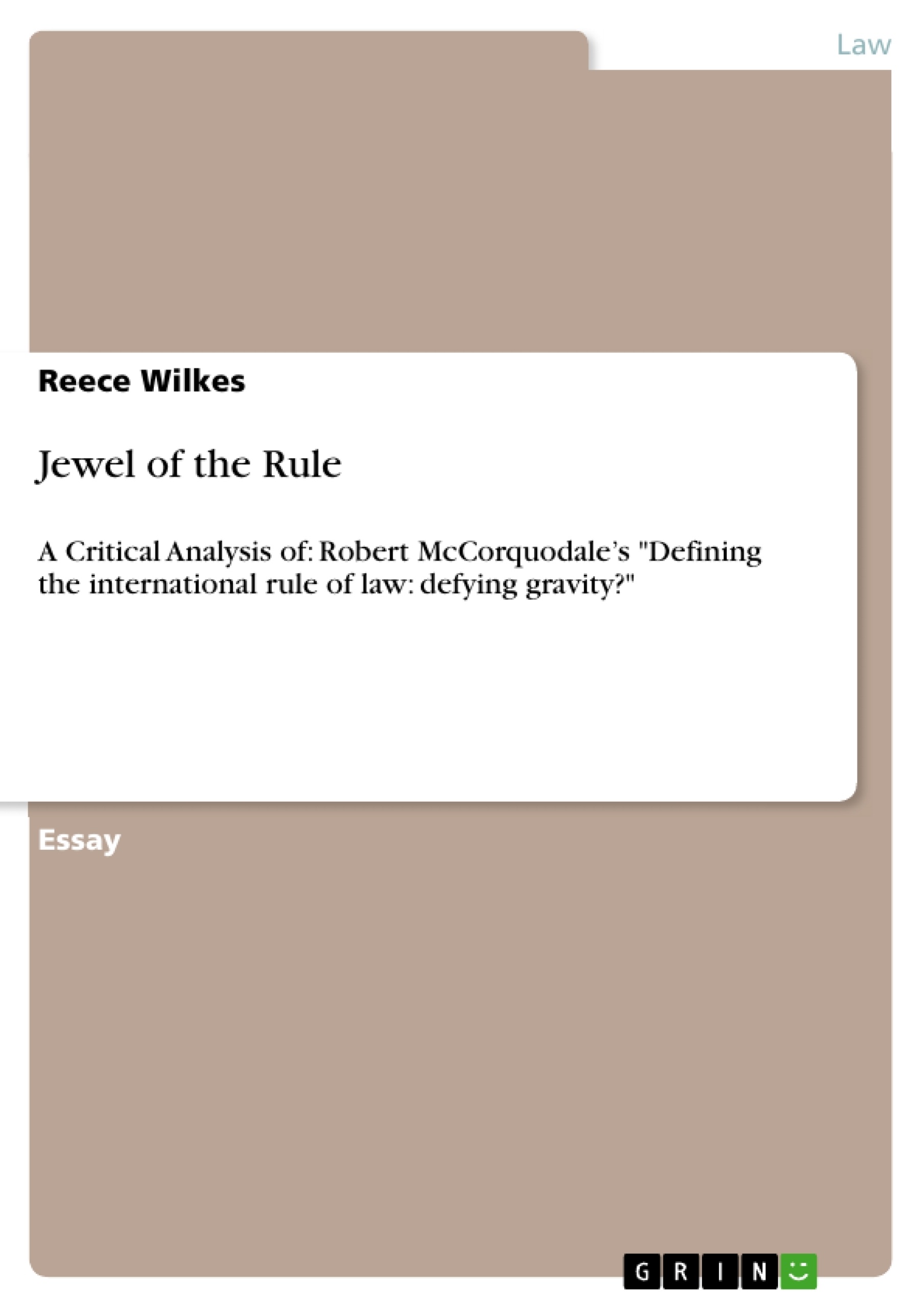In Defining the International Rule of Law: Defying Gravity the commentator McCorquodale assesses the characteristics of the International Rule of Law and whether such conceptual substance has criteria to be identified, thereby creating a definition for all of time. McCorquodale’s paper is to argue that a definition on the International Rule of Law can be set out, taking account of international and national legal systems and considers the objectives of the international rule of law and how these can be enshrined into the international system. He claims that, in its application, relativism is a prominent ingredient in how it is applied globally and despite debate, can be applied even if not completely actualized. He goes onto claim that its measure of compliance is based on a spectrum and not whether a country is simply complying or not.
Inhaltsverzeichnis (Table of Contents)
- Defining the International Rule of Law: Defying Gravity?
- Introduction
- The Spectrum of the Rule of Law
- The Rule of Law and Corruption
- Conclusion
Zielsetzung und Themenschwerpunkte (Objectives and Key Themes)
This paper critically analyzes Robert McCorquodale's article "Defining the International Rule of Law: Defying Gravity?" focusing on his assessment of the characteristics of the International Rule of Law and whether a definitive definition can be established. The paper examines McCorquodale's arguments for a spectrum-based approach to defining the rule of law and evaluates his claims regarding the influence of factors such as democracy, human rights, and corruption on its implementation.
- The nature and definition of the International Rule of Law
- The relationship between democracy, human rights, and the rule of law
- The impact of corruption on the implementation of the rule of law
- The spectrum-based approach to defining the rule of law
- The application of the rule of law in different contexts and sectors
Zusammenfassung der Kapitel (Chapter Summaries)
- Introduction: McCorquodale challenges the notion that the rule of law can be defined in a definitive manner, arguing that it is a concept that is constantly evolving and cannot be fully realized in any single location. He draws a comparison to gravity, which exists as a physical force, while the rule of law is a set of principles striving to be attained.
- The Spectrum of the Rule of Law: McCorquodale argues that the rule of law exists on a spectrum, ranging from complete absence to full actualization. He suggests that different legal systems fall on this spectrum based on their degree of compliance with rule of law principles.
- The Rule of Law and Corruption: The paper examines the interplay between corruption and the rule of law, arguing that corruption undermines the rule of law and creates a system where powerful individuals can circumvent legal processes. McCorquodale's failure to adequately address this issue in his spectrum model is criticized.
Schlüsselwörter (Keywords)
This paper focuses on the international rule of law, its definition, application, and challenges. Key themes include the spectrum of the rule of law, the influence of democracy, human rights, and corruption, and the need for a nuanced understanding of its implementation in different contexts.
Frequently Asked Questions
Can the International Rule of Law be definitively defined?
Commentator McCorquodale argues that it is a constantly evolving concept, similar to gravity, that principles strive to attain rather than a static definition.
What is the "spectrum approach" to the rule of law?
It suggests that compliance with the rule of law is not a binary "yes/no" but exists on a spectrum from complete absence to full actualization.
How does corruption impact the implementation of the rule of law?
Corruption undermines legal processes, allowing powerful individuals to circumvent the law and creating significant challenges for actualizing rule of law principles.
What roles do democracy and human rights play in this context?
The paper evaluates how these factors influence the substance and identification criteria of the International Rule of Law globally.
Is the International Rule of Law applied the same way everywhere?
No, relativism is a prominent ingredient, meaning application varies across international and national legal systems despite universal goals.
- Arbeit zitieren
- Reece Wilkes (Autor:in), 2018, Jewel of the Rule, München, GRIN Verlag, https://www.grin.com/document/426850



